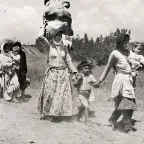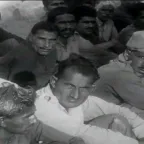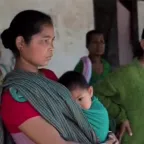From our archives: Women and war
Franco-Prussian war, 1870-1871. A painting of Bazeilles, a village in France, after violent clashes there between French and Bavarian soldiers. In the foreground, among the victims, are a woman and …
Franco-Prussian war, 1870-1871. A painting of Bazeilles, a village in France, after violent clashes there between French and Bavarian soldiers. In the foreground, among the victims, are a woman and …

25th session, Human Rights Council The ICRC acknowledges that migration is a complex phenomenon that concerns millions of people around the world. Although much attention has been paid to this issue …
In this video Safina Bavuga, a Congolese refugee in Kenya, describes the humanitarian assistance he has received since arriving in Kakuma camp. He proposes some improvements that could be made and …

After nearly half a century of conflict, the villagers living on the banks of the Rio Caguan in southern Colombia are cut off from basic health care. Diseases which should be minor rapidly become …

On 7 February 2014, the ICRC completed its 100th visit to the United States detention facility at Guantanamo Bay Cuba, where its delegates have been monitoring the detainees' living conditions since …

The biannual advanced training course in international humanitarian law for university professors took place at the Humanitarium, the ICRC’s new conference and visitors' centre in Geneva, from 4-7 …
The meeting covered conditions of detention and protection for especially vulnerable groups of detainees. This first in-depth meeting examined relevant protections drawn from a variety of …
During the India-Pakistan conflict in 1965, the ICRC was recognized as a neutral intermediary, which allowed its delegates to visit prisoners of war and civilian detainees, assist in repatriation and …

On a visit to New Delhi, the ICRC director-general discusses the strategic partnership between his organization and the Indian Red Cross Society and outlines the humanitarian services the ICRC has …

Try one of the following resources:
Created in 1863, the ICRC library, alongside the ICRC archives, provides an indispensable documentary reference on the organization itself and international humanitarian law.
International humanitarian law is based on a number of treaties, in particular the Geneva Conventions of 1949 and their Additional Protocols, and a series of other instruments.
Customary international humanitarian law consists of rules that come from "a general practice accepted as law" and that exist independent of treaty law.